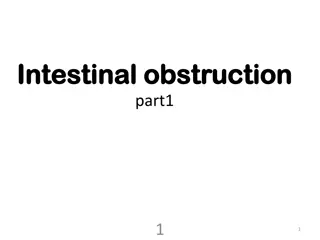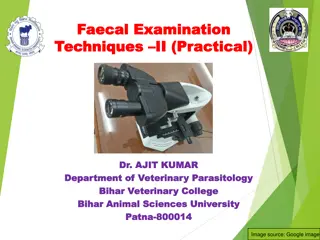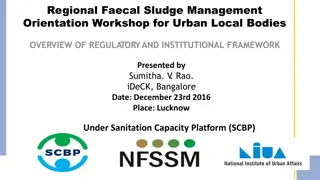Understanding Intestinal Obstruction: Causes, Classification, and Pathophysiology
Intestinal obstruction can be classified into dynamic and adynamic types, with various causes such as intraluminal faecal impaction, malignancy, and hernia. The pathophysiology involves changes in bowel peristalsis and dilation, leading to potential strangulation and ischemia. Morbidity and mortalit
9 views • 40 slides
Advanced Treatment Processes for Faecal Sludge Management
Treatment processes for faecal sludge management involve various stages including preliminary treatment, primary treatment, secondary treatment, and tertiary treatment. Each stage employs mechanical, biological, and chemical processes to separate, decompose, and remove contaminants from the sludge,
0 views • 7 slides
Overview of Faecal Immunochemical Test (FIT) and Faecal Calprotectin in Colorectal Screening
Introduction and evaluation of Faecal Immunochemical Test (FIT) and Faecal Calprotectin for colorectal cancer screening, focusing on the indications for use, exclusion criteria, economic evaluation, and comparison with standard care. Information includes age-specific screening recommendations, diffe
0 views • 31 slides
Faecal Examination Techniques in Veterinary Parasitology at Bihar Animal Sciences University
Explore the practical techniques and methods used for faecal examination in veterinary parasitology at Bihar Animal Sciences University. Learn about qualitative and quantitative methods, egg identification, artifacts, and important principles like floatation method. Visual aids and detailed descript
0 views • 23 slides
Comprehensive Guide to Hygiene Practices and Disease Prevention
This detailed guide covers essential hygiene practices for personal, domestic, and household settings, emphasizing the importance of handwashing, protective equipment, and vaccinations to prevent faecal-oral diseases. Learn about proper sanitation methods and the significance of maintaining cleanlin
0 views • 7 slides
Improving Colorectal Cancer Referrals Using FIT Pathway
The FIT Pathway for suspected colorectal cancer aims to optimize referrals amidst reduced endoscopy availability due to the pandemic. By utilizing the Faecal Immunochemical Test (FIT) to triage patients, it allows for the prioritization of urgent cases, reducing the number of unnecessary colonoscopi
0 views • 34 slides
Managing Colorectal Cancer Referrals during COVID-19 Pandemic
The availability of colonoscopy has been impacted by the pandemic, leading to the adoption of Faecal Immunochemical Testing (FIT) for triaging suspected colorectal cancer referrals. Utilizing FIT results, negative patients are placed on a waiting list for later colonoscopy, allowing quicker assessme
0 views • 34 slides
Legal and Regulatory Framework for Faecal Sludge Management in India
This overview discusses the legal and regulatory framework surrounding faecal sludge management in India, highlighting the current gaps and challenges. It touches upon the absence of specific sanitation laws at both central and state levels, the constitutional basis for the right to sanitation, and
0 views • 18 slides
Understanding Colorectal Disease and Hernia: Comprehensive Overview
Exploring various aspects of colorectal disease and hernia, this overview covers symptoms, family history significance, approach to FHx issues, patient management based on FHx, new 2WW bowel cancer referral guidelines, and the use of faecal calprotectin as a marker. Detailed information provided by
0 views • 73 slides








